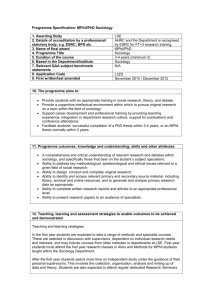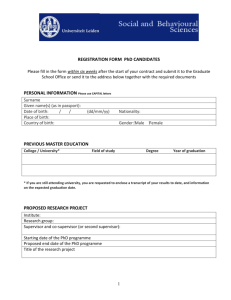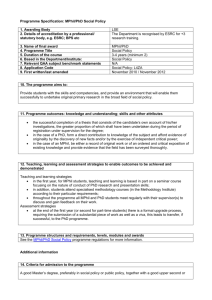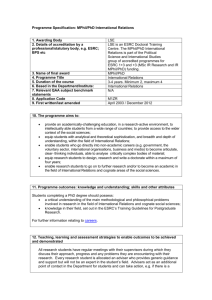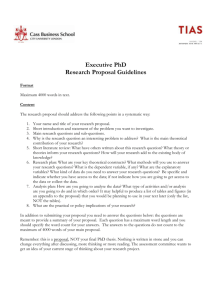Programme Specification: MPhil/PhD Economic History
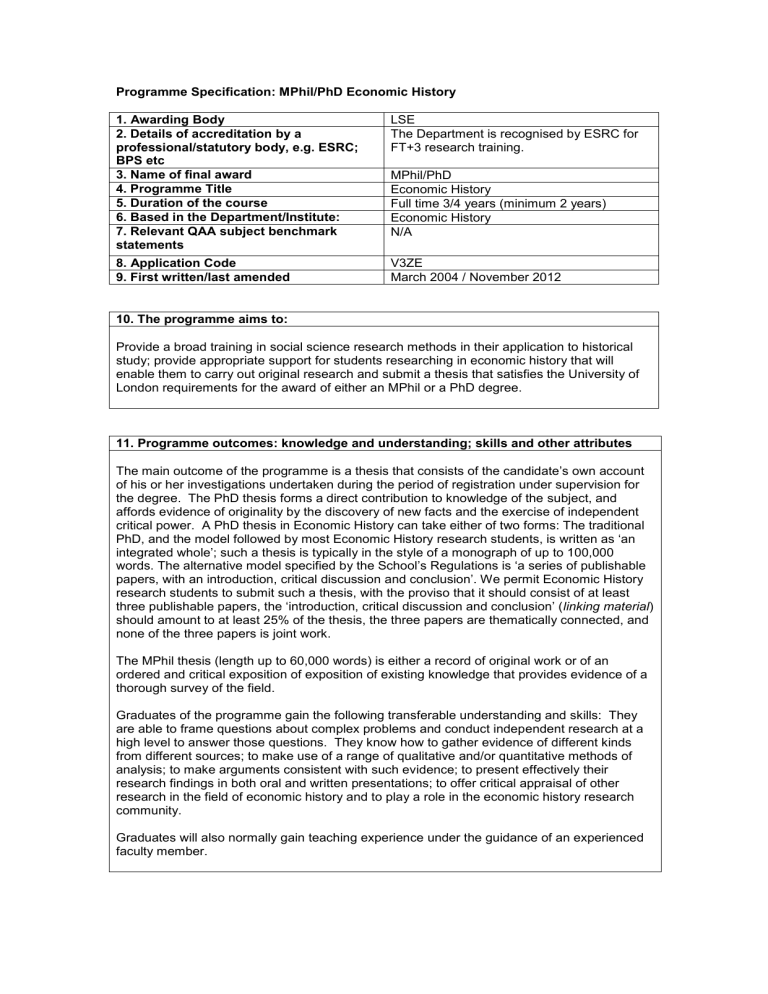
Programme Specification: MPhil/PhD Economic History
1. Awarding Body
2. Details of accreditation by a professional/statutory body, e.g. ESRC;
BPS etc
LSE
The Department is recognised by ESRC for
FT+3 research training.
3. Name of final award
4. Programme Title
5. Duration of the course
6. Based in the Department/Institute:
7. Relevant QAA subject benchmark statements
MPhil/PhD
Economic History
Full time 3/4 years (minimum 2 years)
Economic History
N/A
8. Application Code
9. First written/last amended
10. The programme aims to:
V3ZE
March 2004 / November 2012
Provide a broad training in social science research methods in their application to historical study; provide appropriate support for students researching in economic history that will enable them to carry out original research and submit a thesis that satisfies the University of
London requirements for the award of either an MPhil or a PhD degree.
11. Programme outcomes: knowledge and understanding; skills and other attributes
The ma in outcome of the programme is a thesis that consists of the candidate’s own account of his or her investigations undertaken during the period of registration under supervision for the degree. The PhD thesis forms a direct contribution to knowledge of the subject, and affords evidence of originality by the discovery of new facts and the exercise of independent critical power. A PhD thesis in Economic History can take either of two forms: The traditional
PhD, and the model followed by most Economic History research students, is written as ‘an integrated whole’; such a thesis is typically in the style of a monograph of up to 100,000 words. The alternative model specified by the School’s Regulations is ‘a series of publishable papers, with an introduction, critical discussion and conclusion’. We permit Economic History research students to submit such a thesis, with the proviso that it should consist of at least three publishable papers, the ‘introduction, critical discussion and conclusion’ ( linking material ) should amount to at least 25% of the thesis, the three papers are thematically connected, and none of the three papers is joint work.
The MPhil thesis (length up to 60,000 words) is either a record of original work or of an ordered and critical exposition of exposition of existing knowledge that provides evidence of a thorough survey of the field.
Graduates of the programme gain the following transferable understanding and skills: They are able to frame questions about complex problems and conduct independent research at a high level to answer those questions. They know how to gather evidence of different kinds from different sources; to make use of a range of qualitative and/or quantitative methods of analysis; to make arguments consistent with such evidence; to present effectively their research findings in both oral and written presentations; to offer critical appraisal of other research in the field of economic history and to play a role in the economic history research community.
Graduates will also normally gain teaching experience under the guidance of an experienced faculty member.
12. Teaching, learning and assessment strategies to enable outcomes to be achieved and demonstrated
All registered students followed a prescribed course of study in the first year that includes a course focussing on the conduct and methods of MPhil/PhD research; a graduate research workshop, which is compulsory for all students; any appropriate courses offered by the
Methodology Institute; any additional course recommend by the student’s supervisor. All students are expected to attend the graduate workshop throughout their period as student, and to participate in a range of seminars in the wider research community. Each student is assigned a supervisor or supervisors who are responsible for overseeing the formulation, conduct and completion of the student’s research.
Students learn how to undertake MPhil/PhD research under the guidance of their supervisor or supervisors. The supervisor is expected to help the student in formulating their research topic and guiding them through the literature in the initial months of their thesis. At the same time, students are taking the course EH520 where they learn from other faculty members, and from each other, about the various ways in which professional work in economic history is carried out, partly by analysis of existing work, and partly by developing their own research design ideas within the context of the course. During the succeeding months and years, the role of the supervisor changes from leading the student into the field, to providing the critical analysis of the student’s work. During their studies, students also gain professional experience in how to present their work at the graduate workshop, how to be a discussant and how to chair such seminars.
Students’ progress is assessed by the Department in two ways: a) through the Supervisor and the Doctoral Programme Director. The Supervisor monitors the academic progress of the student, and submits a written report on their progress on an annual basis. Any problems are reported to the Research Student
Tutor. Students funded by the ESRC also have to make an annual report to ESRC.
The Doctoral Programme Director has an overview of the progress of all research students, and also supports them in a range of matters such as applications for financial support. b) through the Graduate Research Committee, which meets annually. The GRC, which is chaired by the Doctoral Programme Director, reviews the work of individual students, and interviews them, on two main occasions. The first of these is toward the end of their first year of research, when the GRC determines whether a student shall be allowed to progress to the second year of research. The second is when a student applies to be upgraded from MPhil to PhD status, normally when around half the thesis has been completed in draft. On both occasions the GRC takes account of advice from the supervisor, of the evidence from the students’ presentations of their research work to the graduate workshop, and of written comments by the GRC members on their draft chapters. Apart from these two occasions, if a student has real difficulties in keeping to their timetable for research, or a supervisor is particularly worried, the GRC will interview the student on a third occasion.
13. Programme structures and requirements, levels, modules and awards
See the PhD Economic History programme regulations
Additional information
14. Criteria for admission to the programme
A good performance in a master’s degree in economic history or another discipline with a substantial economic history component is required. Candidates from the MSc in Economic
History at LSE are required to obtain an overall merit, with a mark of at least 65 in the
dissertation. Students taking taught master’s degrees at other universities are required to achieve an equivalent standard.
In admitting students the School will also take into consideration the quality of the thesis research proposal and the ability of the Department to offer supervision in the proposed area of research.
15. Indicators of quality
examiners’ reports from viva examinations are considered centrally within the School and provide indicators on the quality of the research student experience and supervision quality.
The LSE Careers Centre website provides data on career destinations of LSE research graduates.
The Economic History Department is home to the largest concentration of researchers and teachers in economic history in the UK.
The department currently has some 47 research students, and former PhD students can be found in universities across the UK and across the world. A substantial proportion of research students in economic history are from outside the UK, and most of these return to their home countries to work as academics, or join international organisations such as the World Bank.
The vast majority of students on the programme are successful in obtaining a PhD, usually within the prescribed timeframe, and most go on to publish their work in academic journals and with quality publishers.
The student review process is used rigorously to support the quality of the work being undertaken.
16. Methods for evaluating and improving the quality and standard of teaching and learning
The programme is subject to the School’s overall mechanisms for quality evaluation and improvement. Students in this degree are supervised in the economic history department, although in some cases supervisory duties may be shared with another department. Our departmental mechanisms for reviewing quality and initiating improvement are as follows: a) Review by the departmental Teaching Committee, which includes the Head of
Department and the Doctoral Programme Director b) Review by Department Meeting.
These mechanisms are used to evaluate and improve the quality of teaching and supervision, programme offerings, programme design and assessment. Major changes are decided by the
Department as a whole. Advice and suggestions from examiners of PhD students are an important source of information, as are opinions expressed through staff-student committees,
TQARO student opinion surveys and individual student feedback.
Recognition by the ESRC requires the Department and School to monitor the research programme to ensure that it meets criteria laid down by ESRC.
As with all study programmes at LSE, the PhD programme is subject to a number of Schoolwide mechanisms to ensure quality. These are:
regular staff appraisal and review;
improvements in teaching technique are effected by the Teaching and Learning
Centre (TLC) through observations, advice and further training;
induction programme and mentoring scheme for new members of staff;
Staff/student liaison committee;
centrally administered student satisfaction questionnaires by the Teaching Quality
Assurance and Review Office;
an improved system for ensuring that External Examiner’s comments/recommendations are fed through to Departments and acted upon;
the School’s Teaching, Learning and Assessment Committee (TLAC) which regulates all aspects of teaching quality;
annual monitoring of courses and periodic reviews every 3-5 years. The outcomes of the annual reviews are presented to TLAC;
the School’s Research Degrees Sub Committee which oversees research level programmes and ensure that significant changes to programmes and courses pass through a sequence of formal stages to ensure that curricular changes are appropriate and compatible with other developments.
The Methodology Institute offers methodological training across all MPhil/PhD programme and transferrable study skills training courses are offered by the TLC for all MPhil/PhD students: this central resource enhances the standard of teaching and learning for all research students across the School.
